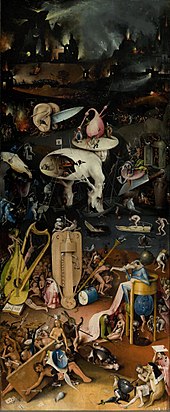
Dutch and Flemish Renaissance painting represents the 16th-century response to Italian Renaissance art in the Low Countries, as well as many continuities with the preceding Early Netherlandish painting. The period spans from the Antwerp Mannerists and Hieronymus Bosch at the start of the 16th century to the late Northern Mannerists such as Hendrik Goltzius and Joachim Wtewael at the end. Artists drew on both the recent innovations of Italian painting and the local traditions of the Early Netherlandish artists.
Antwerp was the most important artistic centre in the region. Many artists worked for European courts, including Bosch, whose fantastic painted images left a long legacy. Jan Mabuse, Maarten van Heemskerck and Frans Floris were all instrumental in adopting Italian models and incorporating them into their own artistic language. Pieter Brueghel the Elder, with Bosch the only artist from the period to remain widely familiar, may seem atypical, but in fact his many innovations drew on the fertile artistic scene in Antwerp.
Dutch and Flemish painters were also instrumental in establishing new subjects such as landscape painting and genre painting. Joachim Patinir, for example, played an important role in developing landscape painting, inventing the compositional type of the world landscape, which was perfected by Pieter Bruegel the Elder who, followed by Pieter Aertsen, also helped popularise genre painting. From the mid-century Pieter Aertsen, later followed by his nephew Joachim Beuckelaer, established a type of "monumental still life" featuring large spreads of food with genre figures, and in the background small religious of moral scenes. Like the world landscapes, these represented a typically "Mannerist inversion" of the normal decorum of the hierarchy of genres, giving the "lower" subject matter more space than the "higher".[1] Anthonis Mor was the leading portraitist of the mid-century, in demand in courts all over Europe for his reliable portraits in a style that combined Netherlandish precision with the lessons of Titian and other Italian painters.

- ^ Snyder, 409–412, 432–445